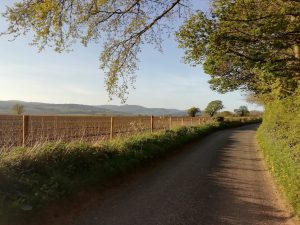What Would a Sustainable Life be Like?
by Phillip Middleton
I have an idea that to some extent this life we are being obliged to live under lockdown due to the COVID-19 pandemic may, in part, reflect the type of life we will need to live in order to live sustainably.
In particular in the UK, because of the reduced economic activity with fewer vehicles on our roads, vastly reduced air travel and fewer jet trails in the sky, there is now a cleaner, fresher feel to the air I’m breathing.

We are making more use of local services. The corner shop is very busy now and a hub for human contact.
There is a welcome appearance of a vibrant and caring local community fostering many self-help and help-others groups. Shopping for the elderly, making, baking and sharing more of our own with each other has been and is, a lovely change that I might wish could last even though the reason for it is so awful.
The reduced range of products in supermarkets and decisions taken to grow our own food, are among the activities that must form a part of any sustainable lifestyle.
To this end the Coronavirus lockdown allows us to experience some important changes that are part of the new reality of sustainable living.
Britain’s economic activity is unsustainably high when compared with other countries. As the fifth largest economy serving a mere 66 million or so people, it is well understood that we would need at least three planets for everyone on Earth to live to the level we presently do in the UK.
This means that we in the UK must reduce our consumption by about two-thirds from current levels if we want to live within the boundaries of equitability (social justice) and sustainability. This represents a much bigger target and greater challenge than simply going carbon neutral by 2050.
We know that China, India, South America, Indonesia, Africa et al, need to improve their economies to a level reflecting a greater degree of fairness and justice within the global polity of humankind (i.e. it is unfair and therefore unsustainable) for the levels of inequality that presently exist, to continue ad infinitum. I hope they will not. I know they should not.
We (all peoples) should be moving as rapidly as possible towards a correction of this imbalance. This should be our development goal: the improvement in human well-being to radically reduce inequality and injustice in human society worldwide.
The ‘carbon budget’ that remains to be burned before triggering the various tipping points of runaway climate change, in all equity and justice, belong to these less developed nations more than to us here in the UK.
We have already made much more than our fair share of planetary pollution. Fossil fuel burning began in the UK. The end of such burning rightly and justly belongs here, too.
As we move towards a figure of 11 billion people on Earth, the number at which experts in the subject expect the population growth curve to plateau – moreover, 11 billion well-informed and globally connected people – the concept of social justice must guide all development.
Starting with wealth caps directly related to the income of the poorest, looking to remove the obscenity of multi-billionaires co-existing with high infant mortality —
it surely cannot be considered right, just or sustainable, that some children die for lack of food and clean water whilst obesity rates skyrocket.
We humans possess an innate sense of fairness, a benefit and a skill needed to be able to co-exist in large numbers. This sense must be outraged at the vast gulf of difference between the haves and have nots of this world.
And education is key. We need an education system which highlights these inequalities, fosters a social conscience and develops empathy, whilst teaching improved cognition, self-reliance and problem-solving skills.
We need an education system that identifies the skill set of the pupil and plays to that skill, incorporating into global human society the gifts we each have to offer.
If humanity is to have any future at all, this future rests in the hands of our children and of our children’s children.
Education of older people is also needed, outside the school system, which would help to move populations towards improved cognition and critical thinking and away from advertisement-driven self-gratification.
People can learn to do things differently when they must. Hasn’t this pandemic proven that to be true?
When life depends on it we can change, adapt and learn to love the new ways, even prefer them to old and abandoned ways of being.
Thank you COVID-19, not for what you are — I can hate you for that, but for what you have shown me, which is a glimpse of a lower-carbon world. A world that is poorer in things, but much much richer in the things that really matter.